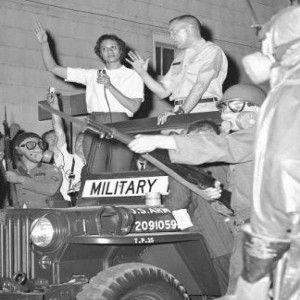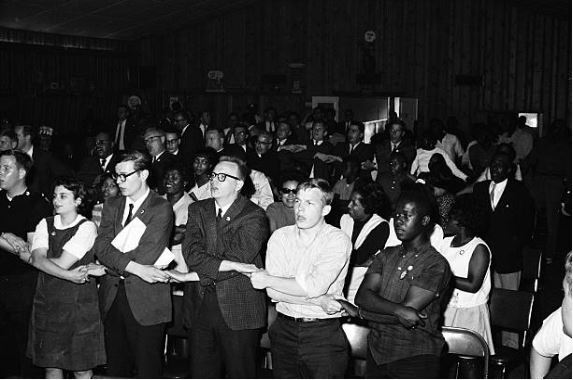
588
Downloads
7
Episodes
The podcast was created by Dion D. Banks and Kisha Petticolas, Cofounders of the Eastern Shore Network for Change. This collection of interviews was recorded and produced by ESNC board member Verlisha Taylor as a part of an event called “Reflections on Pine,” a series of events held in July 2017 to commemorate the civil unrest in Cambridge, Maryland, during the “Long Hot Summer of 1967”. These interviews focus on Cambridge during a time that, for many people, had been ignored. The first six episodes feature stories from Clarabell Tilghman, Barbara Pinder, William “Pee Wee” Jackson, Gloria Richardson, Fred Jackson, and Mayor Victoria Jackson-Stanley.“We will continue to challenge the perceptions of our community by reclaiming our narrative and sharing our truth. Our story of hope, faith, and change; a story of world-class leadership and a resilient community who decided not to accept the status quo as an option,” said Banks. “We are very proud of these first six episodes and hope more people will decide to share their stories with us. We encourage you to listen and connect with our interviewees as they share first-hand life experiences during civil unrest,” said Petticolas. ESNC’s mission is to raise awareness of issues in Dorchester County and creatively work with the community to inform, educate, and foster change, leading to social and economic empowerment. For more information about the organization, visit our website, http://www.esnccambridgemd.com.
The podcast was created by Dion D. Banks and Kisha Petticolas, Cofounders of the Eastern Shore Network for Change. This collection of interviews was recorded and produced by ESNC board member Verlisha Taylor as a part of an event called “Reflections on Pine,” a series of events held in July 2017 to commemorate the civil unrest in Cambridge, Maryland, during the “Long Hot Summer of 1967”. These interviews focus on Cambridge during a time that, for many people, had been ignored. The first six episodes feature stories from Clarabell Tilghman, Barbara Pinder, William “Pee Wee” Jackson, Gloria Richardson, Fred Jackson, and Mayor Victoria Jackson-Stanley.“We will continue to challenge the perceptions of our community by reclaiming our narrative and sharing our truth. Our story of hope, faith, and change; a story of world-class leadership and a resilient community who decided not to accept the status quo as an option,” said Banks. “We are very proud of these first six episodes and hope more people will decide to share their stories with us. We encourage you to listen and connect with our interviewees as they share first-hand life experiences during civil unrest,” said Petticolas. ESNC’s mission is to raise awareness of issues in Dorchester County and creatively work with the community to inform, educate, and foster change, leading to social and economic empowerment. For more information about the organization, visit our website, http://www.esnccambridgemd.com.
Episodes

Sunday Sep 30, 2018
I'm Not Gonna Let Anyone Turn Me Around
Sunday Sep 30, 2018
Sunday Sep 30, 2018
In this episode entitled, "I'm Not Gonna Let Anyone Turn Me Around", we pay homage to Gloria Richardson Dandridge, nationally known Civil Rights Leader of the movement in Cambridge, Maryland.
THE MOVEMENT
In 1961, the Civil Rights Movement appeared in Cambridge, Maryland by way of the Freedom Riders. Cambridge was thoroughly segregated and at the time, the unemployment rate was more than 40%. Gloria Richardson’s teenage daughter, Donna, became involved with the Student Nonviolent Coordinating Committee’s effort to desegregate public accommodations.
While Gloria was interested in the cause, she was not committed to some of their fundamentals. When the SNCC-led protests faltered in 1962, Gloria and other parents created the Cambridge Nonviolent Action Committee (CNAC) which became the only adult-led SNCC affiliate in the civil rights organization’s history. CNAC enlarged the scope of grievances to include housing and employment discrimination and inadequate health care. Richardson was selected to lead CNAC.
This Richardson-led effort differed from most other civil rights campaigns of the era. It took place in a border state rather than the Deep South. It addressed a much wider array of issues rather than the one or two that motivated other campaigns.
Martial Law
Protests and civil unrest in 1963, prompted Maryland Governor J. Millard Tawes to send in the Maryland National Guard. The Guard remained in the city, which was effectively under martial law, for over a year. The Cambridge Movement also drew the attention of U.S. Attorney General Bobby Kennedy who attempted to broker an agreement between Cambridge’s white political leaders and Richardson’s CNAC.

No comments yet. Be the first to say something!